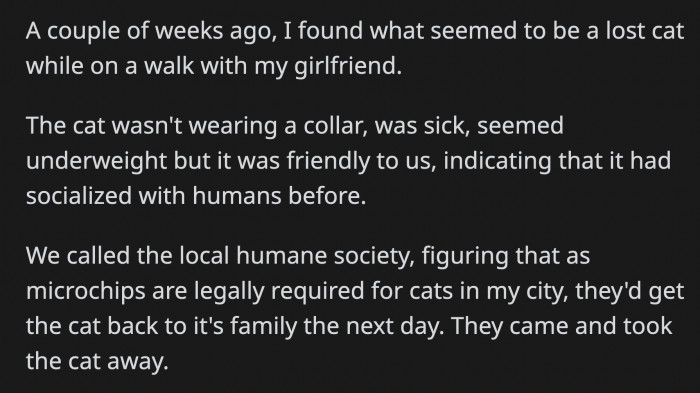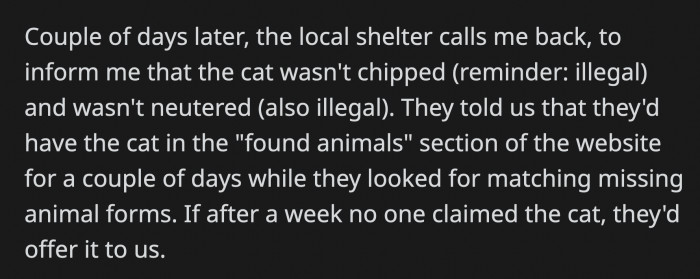Couple Adopts Stray Cat, Only To Find Out That The Owners Who Lived Near Them Want It Back
We always believed that stray cats are good for pest control. They are predators and hunters who can help eliminate the never-ending rat population in our locales.
However, we couldn't be more wrong, according to recent studies. Feral stray cats are detrimental to the environment and do little to eradicate the rat population, according to scientists.
We are living through a mass extinction event, and cats are helpfully speeding that along. Outdoor stray cats have been found to cause the decline of some species of birds, penguins, reptiles, and bats.
They also kill more than they eat, which causes more rats and other scavengers to appear. The increased presence of rats means humans become exposed to the diseases they carry.
Not to mention the threat that cats pose to humans themselves. Stray cats are also known to be the largest cause of rabies infections in the United States.
Apart from that, they carry a parasite that has been linked to causing Alzheimer's, learning issues, and schizophrenia, among other things. Not enough of us know about the threat that wild domesticated cats pose to humans and the environment.
There are still those who believe that they are harmless since they don't really approach humans. Therefore, it's best to report any strays you might encounter roaming your area to your local animal control.
This is what OP did when they found a stray cat during a walk

The cat they found looked sickly and wasn't wearing a collar. OP did the right thing and called the humane society to surrender the cat.

The shelter told OP that the cat wasn't microchipped or fixed — which was a requirement in their city.
The shelter informed OP that they would hold the cat for a week and upload its image on the found animals section of their website. No one claimed ownership of the cat for a week, so the shelter offered it to OP for adoption.

Understanding Attachment Styles
Attachment theory, developed by John Bowlby, explains how early relationships with caregivers shape our emotional responses and relationships throughout life.
The situation with the stray cat reflects a type of attachment disruption, where the children are experiencing a form of loss and longing for their pet.
This phenomenon is often seen in children who have to adapt to sudden changes, such as losing a pet, which can lead to feelings of abandonment.
According to research published in the Journal of Personality and Social Psychology, children often exhibit signs of grief over pet loss similar to that of losing a family member.
OP and their girlfriend bought everything they needed for the cat. They also had it chipped, vaccinated, and neutered; they spent $425 in total to adopt the cat.

OP's girlfriend took a liking to their new cuddly pet when they received a call from the previous owner, informing them that his kids saw their cat in OP's apartment.

They apparently lived on the same street and told OP that the kids wanted their cat back.

Moreover, the emotional responses of both the children and the new owners reveal the complexities of pet ownership and attachment.
Psychologists suggest that pets can serve as secure bases for children, providing comfort and emotional support.
Dr. Sue Johnson, a clinical psychologist, emphasizes the importance of these attachments, stating that pets can help children develop empathy and social skills.
OP told the man that he could either pay him back for everything they spent on the cat, or OP could give them $150 to buy a new cat because OP felt bad for the kids.

The kids go to OP's window to say hi to their old kitty, which OP finds a little intrusive. Still, OP wonders if they are the a**hole for not giving the cat back to the previous owners when the mistake was caused by the shelter in the first place.

Most commenters took OP's side and agreed that they would provide a better life for the cat than the one it would have with its original family.

Navigating Ownership and Emotional Bonds
This scenario also raises legal and ethical questions regarding pet ownership and emotional bonds.
Research indicates that clear communication within families about pet ownership can mitigate conflicts and enhance emotional understanding.
Understanding the psychological implications of pet loss can help families navigate these situations more compassionately.
For instance, involving children in discussions about pets can foster a sense of agency and emotional processing.
OP appreciated the support but said they couldn't help but feel guilty for causing the neighbor's children undue sadness.

However, OP also received a fair amount of backlash for keeping a cat they knew belonged to another family.

OP said that the commenter missed the point of what happened; OP was simply looking to find out if what they did was the best course of action for everyone involved.

This seemed like a reasonable option, but only if OP was willing to work with the family.

They doubled down and told OP they did not believe the cat was exhibiting any signs of abuse.

In another comment, OP said they contacted the shelter to get their version of events and to find out how the mix-up happened in the first place.

It does seem like the original cat's family does not have enough means to provide adequately for the cat, while OP is more than willing to go the extra mile for it.

We do agree that OP is toeing a very gray area when it comes to the humanity of what they did. On the other hand, they did save the cat from a family that couldn't afford to meet its medical needs.
It's just sad to think about the little kids losing their family pets through no fault of their own. Needless to say, we are glad that the cat is in a loving home where it will want for nothing.
Psychological Analysis
This situation highlights the deep emotional connections that children form with their pets, which can be similar to familial attachments.
When pets are suddenly removed, children may experience significant distress, akin to grief, which is often overlooked by adults.
Analysis generated by AI
Analysis & Alternative Approaches
Ultimately, the intersection of emotional bonds and legal ownership of pets can create complex dilemmas. According to Dr. Laura Berman, a renowned sex therapist, "Navigating the emotional landscape of pet ownership requires empathy and understanding, especially when relationships are involved." She emphasizes that "open communication can help all parties involved find a resolution that honors the emotional ties to the pet." This perspective highlights the importance of addressing these issues with care and compassion.



